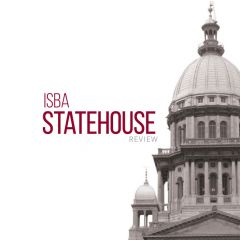Emily S. Sutton has been appointed as an at-large circuit judge in the Ninth Judicial Circuit.
The appointment is effective Aug. 12 and will conclude Dec. 6, 2020, when the position will be filled by the November 2020 general election.
Sutton has worked in private practice since 2008, first as an associate with Scholz, Loos, Palmer, Siebers & Duesterhaus, LLP, and most recently as a partner at Lucie, Scalf, Sutton & Bougher, Attorneys at Law, P.C. From 2012 to 2015, she was also a contract author for Thomson Reuters Corporation, and served as co-author of the Illinois Civil Trial Handbook. Sutton was a law clerk to Fourth District Appellate Justice Robert W. Cook from 2004-2008 and has also served on the adjunct faculty at Quincy University.


